Pierre Poilievre called lobbyists 'utterly useless,' but they're still attending his fundraisers
CBC
Tue, May 7, 2024
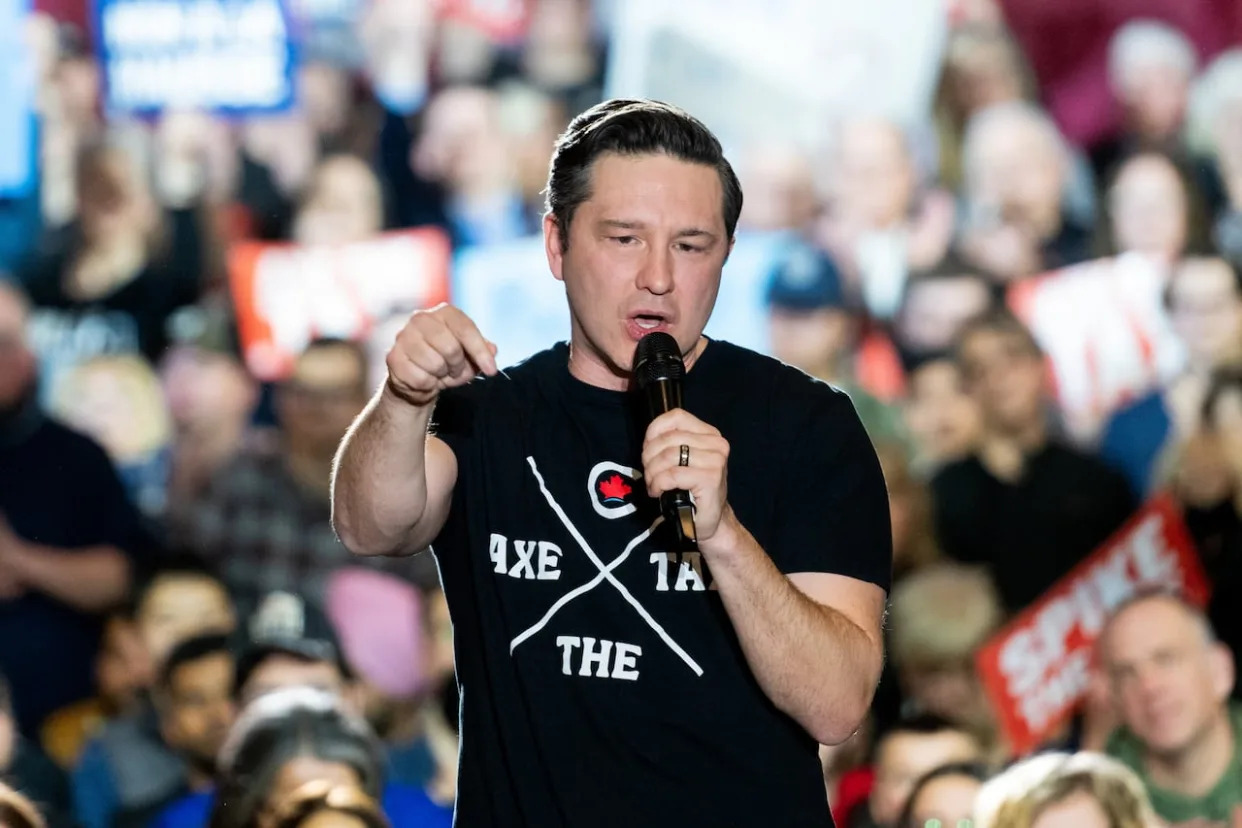
Conservative Party Leader Pierre Poilievre speaks during a rally in Ottawa, on Sunday, March 24, 2024. A CBC News analysis shows Poilievre has headlined roughly 50 fundraisers at private venues since becoming Conservative leader in 2022. A party spokesperson says Poilievre is available at events across the country and there's no need to attend a fundraiser to get access to him. (Spencer Colby/The Canadian Press - image credit)More
As Pierre Poilievre presents himself as both a prime minister in waiting and a champion of "the working-class people," he's headlined roughly 50 fundraisers at private venues since becoming Conservative leader in 2022 — some of them in Canada's wealthiest neighbourhoods and most exclusive clubs.
A CBC News analysis of fundraising reports the Conservatives submitted to Elections Canada show these fundraisers have attracted dozens of registered federal lobbyists who paid up to $1,725 each to attend events featuring Poilievre.
Business executives — including a billionaire oil tycoon, an airline executive and a vice president at AtkinsRéalis, formerly known as SNC-Lavalin — are on the lists of attendees.
These fundraisers are legal and have a long history in Canadian politics. In a statement issued to CBC News, a Conservative Party spokesperson said Poilievre makes himself available at events across the country and there's no need to attend a fundraiser to get access to him.
But such fundraisers have led to media scrutiny and opposition criticism in the past — some of it coming from Poilievre.
Poilievre has criticized Prime Minister Justin Trudeau over his fundraising events in the past. He described one event in 2019 as a "$1,500 ticket fundraiser where he was speaking to a bunch of well-connected Liberal lobbyists and wealthy donors."
Last Friday, Poilievre published an opinion piece in the National Post calling on corporate Canada to fire its lobbyists, describing them as "useless and overpaid."
Poilievre criticized lobbyists in the article, saying the only way "any business lobby has born fruit" has been through "undue handouts, privileges and protections" that "Justin Trudeau has been all too willing to grant." He said businesses will "get nothing from me unless they convince the people first."

Conservative Leader Pierre Poilievre addresses the national Conservative caucus on Parliament Hill in Ottawa on Sunday, Jan. 28, 2024. The Conservative Party of Canada raised more than $35 million during Pierre Poilievre's first full year as leader — and the federal Liberals brought in less than half that amount.
Conservative Leader Pierre Poilievre addresses the national Conservative caucus on Parliament Hill in Ottawa on Sunday, Jan. 28, 2024. The Conservative Party of Canada raised more than $35 million during Pierre Poilievre's first full year as leader — and the federal Liberals brought in less than half that amount. (Sean Kilpatrick/The Canadian Press)
The Liberal Party's fundraising practices came under scrutiny in 2016 when the Globe and Mail revealed Prime Minister Trudeau attended a fundraiser with a Chinese businessman who went on to donate $200,000 to the Pierre Elliott Trudeau Foundation.
To ward off claims the Liberals were giving wealthy donors preferential access to Trudeau and his cabinet, the party changed its policy in 2017 to limit these events to publicly available spaces and to allow journalists access.
The government also changed the law in 2018 to require that parties make these fundraisers more transparent by posting online notices in advance and reporting details, including lists of attendees, to Elections Canada.
The Conservatives said they were "concerned" about the bill earlier that year and later voted against it. Then-finance critic Gérard Deltell said these fundraisers were "unethical" and would legalize what he called "cash-for-access, or paying to get access to decision-makers."
Poilievre calls lobbyists 'utterly useless'
The National Post article is not the first instance of Poilievre accusing business leaders of trying to cozy up to the governing Liberal Party.
In December, Poilievre expressed disdain for Bay Street executives, saying he "almost never" speaks to crowds in downtown Toronto or "anywhere close to Bay Street."
Fundraising records show Poilievre has headlined three fundraisers for the Conservative Party on Bay Street and at least four others in downtown Toronto since 2023.
In March, Poilievre told the Greater Vancouver Board of Trade that, rather than speaking to business associations like it, he's appeared at "110 shop floors and five union local facilities." He said his experience with corporate lobbyists in Ottawa has "been that they have been utterly useless in advancing any common sense interests for the people on the ground."
Poilievre said these lobbyists are focused on getting lunches with ministers at the elite Rideau Club atop a downtown Ottawa office tower.
"When I'm prime minister, my obsession — my daily obsession — will be about what is good for the working class people of this country," Polievre said during his speech on March 8.
CBC News examined the lists of attendees on the Conservatives' fundraising reports filed with Elections Canada since Poilievre became leader in September 2022. CBC cross-referenced those lists with names in the federal lobbyist registry, then verified the names of lobbyists directly or through cross-referencing publicly available information.
CBC News found that more than 25 active federal lobbyists have attended these fundraisers since Poilievre became leader in 2022. The names of more than 100 inactive (but still registered) federal lobbyists matched those of listed attendees at these fundraisers during that time frame.
The Breach conducted an analysis in March and reported that out of the 35 Poilievre fundraising events it examined, 29 were attended by at least one lobbyist active in the past several years.
NDP ethics critic Matthew Green said his problem is with the "hypocrisy of Pierre Poilievre." Green accused Poilievre of "cosplaying as a working class guy" while privately attending fundraisers in exclusive clubs "most Canadians would have never heard of."
"This is a guy who is not who he says he is," Green told CBC News. "This is somebody who is the 'elites' that he rails against."
CBC News contacted the Conservative Party and Poilievre's office with questions about the fundraisers.
In an email, the Conservatives accused CBC News of "exposing its bias by investigating Canadians, who are supporting common sense Conservative Leader Pierre Poilievre and his promise to defund the CBC."
Sarah Fischer, a spokesperson for the Conservative Party, told CBC News in an email that Poilievre makes "himself available across the country at rallies, visiting small businesses, lumber yards and factory floors.
"There's no need to attend a fundraiser to get access to Pierre Poilievre."
Big pharma, an oil 'tycoon' and top Canadian executives
Active lobbyists representing the oil and natural gas company Cenovus, Pharmascience Inc. and the Pembina Pipeline Corporation are among those listed as having attended Poilievre fundraisers.
Other lobbyists from the shipbuilding, energy and pharmaceutical industries confirmed their attendance to CBC News.
Adam Waterous, recently described in a media report as an "investment banker turned oil tycoon," is listed as having attended a Poilievre event with his wife Jan and son Connor, who lobbies, in April 2023 in Banff, Alta., where he owns a ski resort.
Waterous has not yet responded to CBC's request for comment.
Robert Deluce, the founding president and former CEO of Porter Airlines, attended a fundraiser in January 2023, co-organized by Mark Mulroney, the son of former prime minister Brian Mulroney. Deluce now serves as the company's executive chairman.
A spokesperson for the airline told CBC News Deluce contributed to the fundraiser "in a personal capacity" and spoke briefly to Poilievre but not about Porter.
Poilievre supports a runway expansion to bring jets to the Billy Bishop airport in Toronto — something Porter has long sought.
Erik Ryan, a vice president at AtkinsRéalis, formerly known as SNC-Lavalin, attended a reception in January with Poilievre and told CBC News he gave a personal contribution. Ryan was involved in a lobbying effort to get a deferred prosecution agreement for SNC-Lavalin from the federal government.
Ian Stedman, an associate professor of public law and governance at York University, said the "public should care about these events and who's there."
"It tells you something about who has privileged access to a politician who might have the ability to affect change or advance policy initiatives," Stedman said.
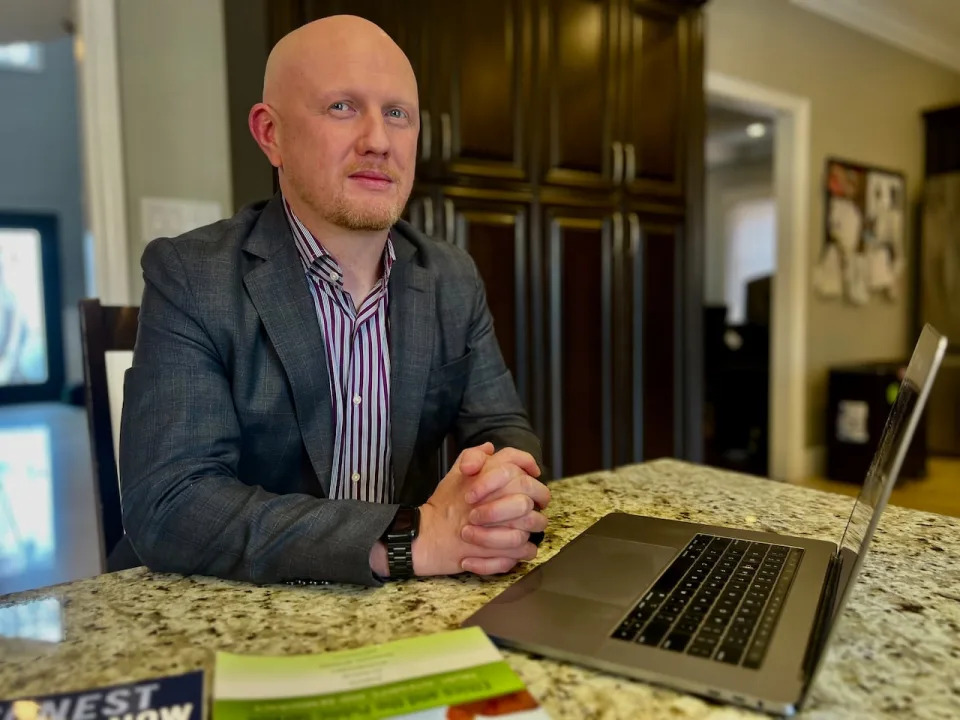
York University professor Ian Stedman said lobbying is not inherently bad, but exclusive fundraisers create a mechanism for people with more money to get "preferential" access to politicians.
York University professor Ian Stedman said lobbying is not inherently bad, but exclusive fundraisers create a mechanism for people with more money to get "preferential" access to politicians. (Hugo Levesque/CBC)
Stedman said "lobbying is not bad" but "the problem here is that some people get better access and more preferential access than others, and it seems to be because of the money they have."
But Fred DeLorey, the national Conservative campaign manager during the 2021 election, said lobbying at these fundraisers is "unheard of."
DeLorey, who is a lobbyist himself, said it "would be very poor form to try to bend the ear of a leader at a place like that."
Asked whether those attending these fundraisers would get increased access to political leaders, Delorey said no.
There's a strict limit on how much individual Canadians are allowed to give to a federal political party each year. In 2024, the limit is $1,725.
"There's no political influence on cutting a check at that amount to a leader that's trying to govern a G7 country," said DeLorey, who is a partner at NorthStar Public Relations and Government Relations. "It's just not a thing."
Riding high in the polls, the Conservative Party of Canada continues to out-fundraise other parties and broke its own record in the most recent quarter. The party raised more than $10.6 million from more than 51,000 donors between January and March.
About 700 of those donors attended fundraising events with Poilievre — fundraisers which could have collected up to $1 million during that time period. Fischer did not answer when asked how much money the party collected in 2023 and over the first quarter of this year at fundraisers Poilievre headlined.
She said that out of 200,000 contributions, the average donation to the Conservatives was $175.
"Hundreds of thousands of Canadians are choosing to put their hard-earned dollars behind Pierre Poilievre and his mission to axe the tax, build the homes, fix the budget and stop the crime," she said in an email.
Private clubs
Poilievre has headlined fundraisers at Canada's oldest private club — the Toronto Club — at the members-only Terminal City Club in Vancouver and at the Royal Glenora Club in Edmonton, where the fee for a membership is more than $20,000.
Poilievre has headlined more than 16 fundraisers in private homes since becoming leader, including in one of Montreal's wealthiest neighbourhood — Westmount — and affluent neighbourhoods in the greater Toronto area. Another one is booked for later this week in North York.
One of these "Evenings with Pierre Poilievre in support of the Conservative Party'' took place at a home in Forest Hill South in Toronto, the records show. Two homes are for sale in the same postal code with asking prices of $7.5 million and $16.9 million.
Poilievre also has been touring the country holding public events and fundraisers in local businesses and restaurants.
'Like a town hall meeting'
Yaroslav Baran, co-founder of Pendulum Group and former Conservative director of war room communications under prime minister Stephen Harper, said there's a "mythology" around these fundraisers that doesn't reflect reality.
"People picture cigars, brandy snifters and mahogany furniture," said Baran who ran communications for the Conservative Party during the 2022 leadership race.
"It's really a lot like a town hall meeting … except it's a closed event. You need to buy a ticket to get in. It usually consists of a mini speech, a stump speech by the featured speaker."
Baran said what follows after that is "an endless stream of grip-and-grin" photos, where the headlining politician shakes hands, smiles for the camera and then moves on to the next person with about two or three seconds to exchange a few words.
"The idea of being able to have any kind of a prolonged, deep policy conversation to, you know, sway somebody, it's just laughable," he said.
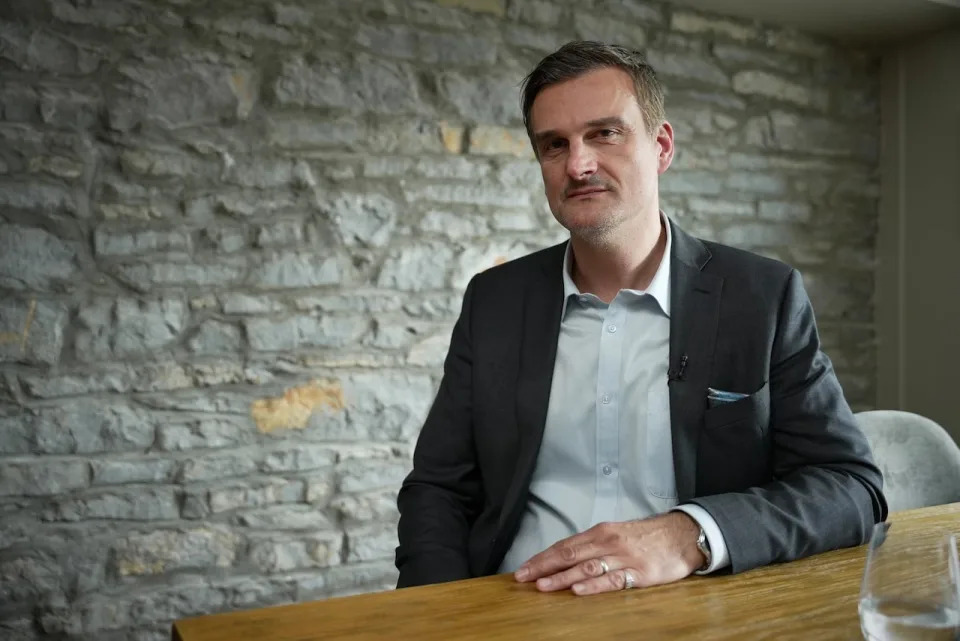
Yaroslav Baran, a former director of war room communications under Prime Minister Stephen Harper, said there's an inaccurate "mythology" to private fundraising events, but that they typically involve shaking hands with the guest of honour and listening to a stump speech.
Yaroslav Baran, a former director of war room communications under Prime Minister Stephen Harper, said there's an inaccurate "mythology" to private fundraising events, but that they typically involve shaking hands with the guest of honour and listening to a stump speech. (Pierre-Paul Couture/CBC)
Lobbyists go to these events to build relationships and be seen, Baran said. But he cautions that if they're looking to lobby someone directly, they shouldn't go to their party fundraisers.
Trudeau attended 14 of these events to raise money for the Liberal Party in 2023 and one so far in 2024, held at convention centres, hotels and the Canadian War Museum. Last year, the Investigative Journalism Foundation reported that 166 lobbyists have attended Liberal fundraisers since 2019.
Liberal Party spokesperson Parker Lund said the party is "committed to the strongest standards in federal politics for openness and transparency with political fundraising events." The party also posts its fundraising reports on its website.
In 2021, Lobbying Commissioner Nancy Bélanger made preliminary recommendations to strengthen the lobbying regime, calling for expanding the amount of contextual information required in communication reports to include things like political donations.
Ethics Commissioner Konrad von Finckenstein has described the current reporting requirements for these fundraisers as "perfectly good." He said that if the government wants to, it could go further and legislate its existing fundraising and lobbying best practices for ministers and parliamentary secretaries to cover opposition critics.
Just how far is Pierre Poilievre willing to take the notwithstanding clause?
CBC
Tue, May 7, 2024
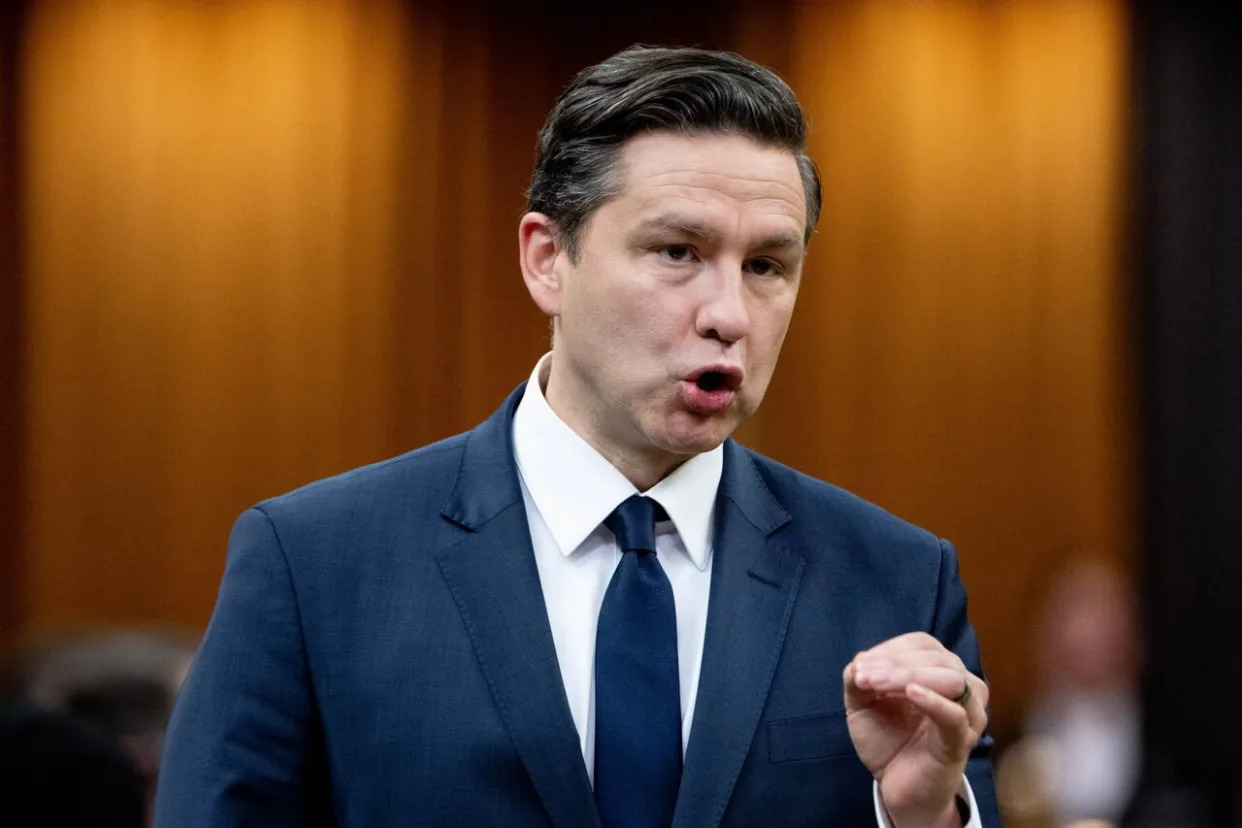
Conservative Party Leader Pierre Poilievre rises during Question Period on Parliament Hill in Ottawa on Monday, May 6, 2024. (Spencer Colby/The Canadian Press - image credit)
In January, the Federal Court found that the Trudeau government's use of the Emergencies Act to respond to the protests of the self-styled freedom convoy in 2022 was not properly justified — a decision the federal government is now appealing.
At the time, Conservative Leader Pierre Poilievre celebrated that ruling.
"Today, in a landmark victory for the freedoms of Canadians, the Federal Court ruled that Trudeau broke the highest law in the land," he said in a prepared statement, apparently referring to the Charter of Rights and Freedoms.
"Common-sense Conservatives will protect the Charter rights of Canadians, and as prime minister I will unite our country and our people for hope and freedom."
A few months later, Poilievre's support for the Charter rights of Canadians seems less than absolute.
Last week, the Conservative leader appeared before a meeting of the Canadian Police Association and outlined — or at least hinted at — his plans to use the notwithstanding clause to safeguard his government's laws from being overturned by the courts.
"All of my proposals are constitutional. And we will make sure — we will make them constitutional, using whatever tools the Constitution allows me to use to make them constitutional," he said. "I think you know exactly what I mean."
Poilievre went on to explain his own theory of how the use of the notwithstanding clause could be justified.
"I will be the democratically elected prime minister — democratically accountable to the people, and they can then make the judgments themselves on whether they think my laws are constitutional, because they will be," he said.
Unloved and controversial, the notwithstanding clause is an unavoidable feature of the Charter of Rights and Freedoms — part of the negotiated agreement that created the Charter in the first place. There are also reasonable, if theoretical, arguments to be made for its necessity — judges are not infallible and a mechanism to overrule egregious decisions could be better than the alternatives.
The question, then, is what circumstances justify its use.
How would Poilievre use the notwithstanding clause?
Poilievre's office insists a Conservative government would use the notwithstanding clause only to deal with "matters of criminal justice." But that could cover a number of things.
Would a Poilievre government use the clause to save mandatory-minimum sentences that the Supreme Court has found constitute cruel and unusual punishment? What if the court ultimately rules against the bail restrictions that Poilievre has said he would implement?
In 2011, the Supreme Court ruled that the previous Conservative government's attempts to block a supervised drug consumption site in Vancovuer — Insite — violated the Charter right to life, liberty and security of the person. Would the Poilievre government use the notwithstanding clause to implement elements of its response to the opioid epidemic?
In his remarks to the Canadian Police Association, Poilievre said he would prioritize the right of Canadians to live free of crime.
"Those are the constitutional rights that we have to start to focus on in this country — the rights of the victims and the law-abiding people," he said.
But that necessitates another question — would any of his proposed changes actually reduce crime? Would using the notwithstanding clause actually make Canadians safer, or would it merely satisfy a desire to get "tough" on crime?
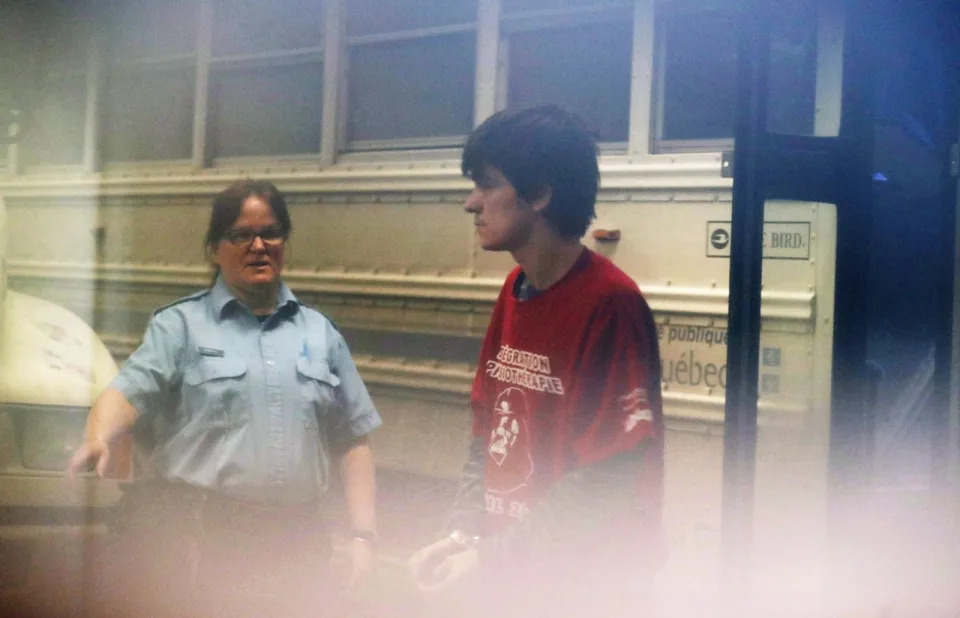
Alexandre Bissonnette, a suspect in a shooting at a Quebec City mosque, arrives at the court house in Quebec City on Tuesday, February 21, 2017. The accused in Quebec City's deadly mosque shooting formally changed lawyers on Thursday during a brief court hearing. Alexandre Bissonnette, 27, appeared briefly before Quebec court Judge Jean-Louis Lemay and acknowledged he was bringing in a new attorney.THE CANADIAN PRESS/Mathieu Belanger - POOLMore
At the moment, the Conservatives like to point to the case of Alexandre Bissonnette, who killed six men inside a Quebec City mosque in 2017. The Supreme Court later ruled that forcing Bissonnette to serve his sentences consecutively — effectively eliminating his chance of ever being eligible for parole — "shakes the very foundations of Canadian law."
During his campaign for the Conservative leadership in 2022, Poilievre said he would use the notwithstanding clause to revive consecutive sentences (a law originally passed by Stephen Harper's Conservative government).
Lisa Kerr, a law professor at Queen's University, noted in an op-ed this week that being eligible for parole does not mean you necessarily receive it.
Using the notwithstanding clause to "stack life sentences to infinity would add nothing to public safety," she wrote.
The politics of Poilievre's position are obvious — probably no politician is eager to be seen defending the rights of an individual such as Bissonnette. But if or when Parliament crosses the Rubicon (the federal Parliament has never before used the notwithstanding clause), it will be impossible to guarantee the ramifications will be felt only by society's least sympathetic members.
What message would it send?
"Whatever the use he wants to make of it," Bloc Quebecois Leader Yves-Francois Blanchet said last week, "the fact a federal leader would want to use the notwithstanding clause makes it clear that it's absolutely legit for Quebec or any province to do the same."
That is not an abstract argument.
The original theory of the notwithstanding clause was that "political accountability" would restrain governments from using it. That restraint hasn't been much in evidence in recent years.

Ontario Premier Doug Ford speaks during a funding announcement, Friday, April 5, 2024 in Ottawa. Ontario Premier Doug Ford is one of several premiers to use the notwithstanding clause to protect laws from being overturned for violating a Charter right. (Adrian Wyld/The Canadian Press)
The Ontario government has invoked the clause to protect a law that limits political advertising by third-party groups. The Saskatchewan government is applying the notwithstanding clause to protect legislation that could affect the rights of transgender children. Quebec's Bill 21 raises major questions about religious freedom.
As Blanchet's response suggests, federal use of the notwithstanding clause would only give these provinces an example to justify their own actions. Poilievre's position on the clause also likely would disqualify him from weighing in as prime minister against any current or future provincial action.
Poilievre's reply to all this seems to be that it's ultimately up to voters — if Canadians don't like how the notwithstanding clause is being used, they can put another government in power.
But elections are rarely fought as single-issue referendums. (Advocates of electoral reform would also note that, under first-past-the-post voting, governments regularly hold power without having won 50 per cent of the popular vote.) And deferring to the will of voters contradicts one of the primary reasons for codifying rights in the first place — to protect individuals and minorities from the whims of the majority.
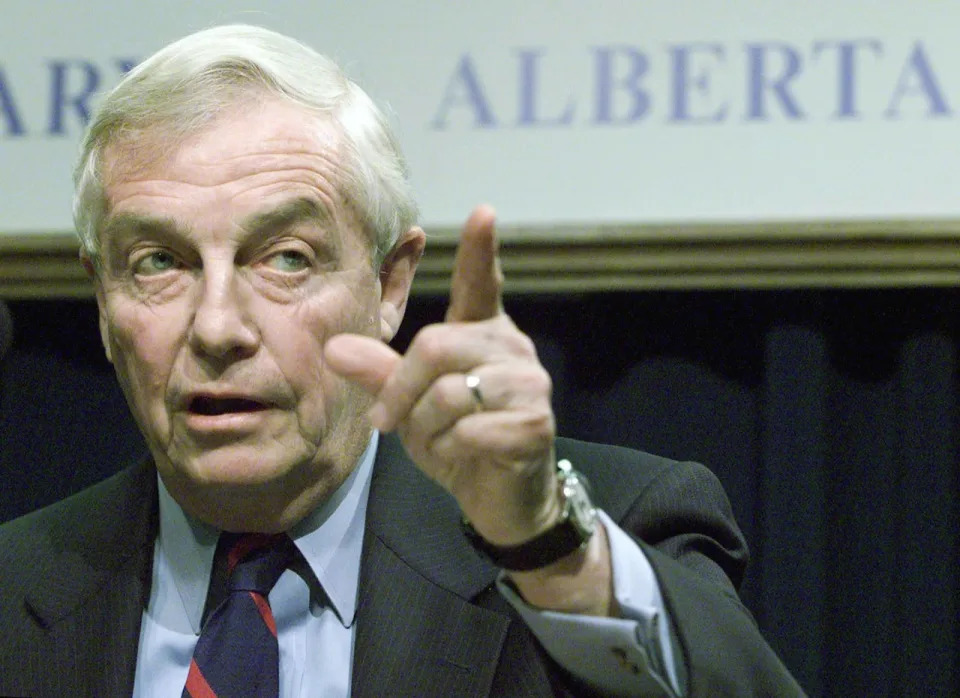
Former Alberta premier Peter Lougheed gestures during a news conference in Calgary in 2002. Former Alberta premier Peter Lougheed came to believe in the need for guardrails around the notwithstanding clause. (The Canadian Press)
Poilievre's calculus might also offend more than just critics of the notwithstanding clause. Peter Lougheed, the former Alberta premier who played a significant part in getting the notwithstanding clause into the Charter, eventually came to believe that a supermajority vote of 60 per cent of members of a legislature should be required to invoke the clause. (In a 343-member House of Commons, that would mean the support of 206 MPs.)
Between Saskatchewan Premier Scott Moe deciding to defy (or unilaterally reinterpret?) federal carbon-pricing legislation and Poilievre's position on the notwithstanding clause, Conservatives seem to be moving toward the view that premiers and prime ministers have wide latitude to decide which laws they must follow.
CBC
Tue, May 7, 2024

Conservative Party Leader Pierre Poilievre rises during Question Period on Parliament Hill in Ottawa on Monday, May 6, 2024. (Spencer Colby/The Canadian Press - image credit)
In January, the Federal Court found that the Trudeau government's use of the Emergencies Act to respond to the protests of the self-styled freedom convoy in 2022 was not properly justified — a decision the federal government is now appealing.
At the time, Conservative Leader Pierre Poilievre celebrated that ruling.
"Today, in a landmark victory for the freedoms of Canadians, the Federal Court ruled that Trudeau broke the highest law in the land," he said in a prepared statement, apparently referring to the Charter of Rights and Freedoms.
"Common-sense Conservatives will protect the Charter rights of Canadians, and as prime minister I will unite our country and our people for hope and freedom."
A few months later, Poilievre's support for the Charter rights of Canadians seems less than absolute.
Last week, the Conservative leader appeared before a meeting of the Canadian Police Association and outlined — or at least hinted at — his plans to use the notwithstanding clause to safeguard his government's laws from being overturned by the courts.
"All of my proposals are constitutional. And we will make sure — we will make them constitutional, using whatever tools the Constitution allows me to use to make them constitutional," he said. "I think you know exactly what I mean."
Poilievre went on to explain his own theory of how the use of the notwithstanding clause could be justified.
"I will be the democratically elected prime minister — democratically accountable to the people, and they can then make the judgments themselves on whether they think my laws are constitutional, because they will be," he said.
Unloved and controversial, the notwithstanding clause is an unavoidable feature of the Charter of Rights and Freedoms — part of the negotiated agreement that created the Charter in the first place. There are also reasonable, if theoretical, arguments to be made for its necessity — judges are not infallible and a mechanism to overrule egregious decisions could be better than the alternatives.
The question, then, is what circumstances justify its use.
How would Poilievre use the notwithstanding clause?
Poilievre's office insists a Conservative government would use the notwithstanding clause only to deal with "matters of criminal justice." But that could cover a number of things.
Would a Poilievre government use the clause to save mandatory-minimum sentences that the Supreme Court has found constitute cruel and unusual punishment? What if the court ultimately rules against the bail restrictions that Poilievre has said he would implement?
In 2011, the Supreme Court ruled that the previous Conservative government's attempts to block a supervised drug consumption site in Vancovuer — Insite — violated the Charter right to life, liberty and security of the person. Would the Poilievre government use the notwithstanding clause to implement elements of its response to the opioid epidemic?
In his remarks to the Canadian Police Association, Poilievre said he would prioritize the right of Canadians to live free of crime.
"Those are the constitutional rights that we have to start to focus on in this country — the rights of the victims and the law-abiding people," he said.
But that necessitates another question — would any of his proposed changes actually reduce crime? Would using the notwithstanding clause actually make Canadians safer, or would it merely satisfy a desire to get "tough" on crime?

Alexandre Bissonnette, a suspect in a shooting at a Quebec City mosque, arrives at the court house in Quebec City on Tuesday, February 21, 2017. The accused in Quebec City's deadly mosque shooting formally changed lawyers on Thursday during a brief court hearing. Alexandre Bissonnette, 27, appeared briefly before Quebec court Judge Jean-Louis Lemay and acknowledged he was bringing in a new attorney.THE CANADIAN PRESS/Mathieu Belanger - POOLMore
At the moment, the Conservatives like to point to the case of Alexandre Bissonnette, who killed six men inside a Quebec City mosque in 2017. The Supreme Court later ruled that forcing Bissonnette to serve his sentences consecutively — effectively eliminating his chance of ever being eligible for parole — "shakes the very foundations of Canadian law."
During his campaign for the Conservative leadership in 2022, Poilievre said he would use the notwithstanding clause to revive consecutive sentences (a law originally passed by Stephen Harper's Conservative government).
Lisa Kerr, a law professor at Queen's University, noted in an op-ed this week that being eligible for parole does not mean you necessarily receive it.
Using the notwithstanding clause to "stack life sentences to infinity would add nothing to public safety," she wrote.
The politics of Poilievre's position are obvious — probably no politician is eager to be seen defending the rights of an individual such as Bissonnette. But if or when Parliament crosses the Rubicon (the federal Parliament has never before used the notwithstanding clause), it will be impossible to guarantee the ramifications will be felt only by society's least sympathetic members.
What message would it send?
"Whatever the use he wants to make of it," Bloc Quebecois Leader Yves-Francois Blanchet said last week, "the fact a federal leader would want to use the notwithstanding clause makes it clear that it's absolutely legit for Quebec or any province to do the same."
That is not an abstract argument.
The original theory of the notwithstanding clause was that "political accountability" would restrain governments from using it. That restraint hasn't been much in evidence in recent years.

Ontario Premier Doug Ford speaks during a funding announcement, Friday, April 5, 2024 in Ottawa. Ontario Premier Doug Ford is one of several premiers to use the notwithstanding clause to protect laws from being overturned for violating a Charter right. (Adrian Wyld/The Canadian Press)
The Ontario government has invoked the clause to protect a law that limits political advertising by third-party groups. The Saskatchewan government is applying the notwithstanding clause to protect legislation that could affect the rights of transgender children. Quebec's Bill 21 raises major questions about religious freedom.
As Blanchet's response suggests, federal use of the notwithstanding clause would only give these provinces an example to justify their own actions. Poilievre's position on the clause also likely would disqualify him from weighing in as prime minister against any current or future provincial action.
Poilievre's reply to all this seems to be that it's ultimately up to voters — if Canadians don't like how the notwithstanding clause is being used, they can put another government in power.
But elections are rarely fought as single-issue referendums. (Advocates of electoral reform would also note that, under first-past-the-post voting, governments regularly hold power without having won 50 per cent of the popular vote.) And deferring to the will of voters contradicts one of the primary reasons for codifying rights in the first place — to protect individuals and minorities from the whims of the majority.

Former Alberta premier Peter Lougheed gestures during a news conference in Calgary in 2002. Former Alberta premier Peter Lougheed came to believe in the need for guardrails around the notwithstanding clause. (The Canadian Press)
Poilievre's calculus might also offend more than just critics of the notwithstanding clause. Peter Lougheed, the former Alberta premier who played a significant part in getting the notwithstanding clause into the Charter, eventually came to believe that a supermajority vote of 60 per cent of members of a legislature should be required to invoke the clause. (In a 343-member House of Commons, that would mean the support of 206 MPs.)
Between Saskatchewan Premier Scott Moe deciding to defy (or unilaterally reinterpret?) federal carbon-pricing legislation and Poilievre's position on the notwithstanding clause, Conservatives seem to be moving toward the view that premiers and prime ministers have wide latitude to decide which laws they must follow.
No comments:
Post a Comment